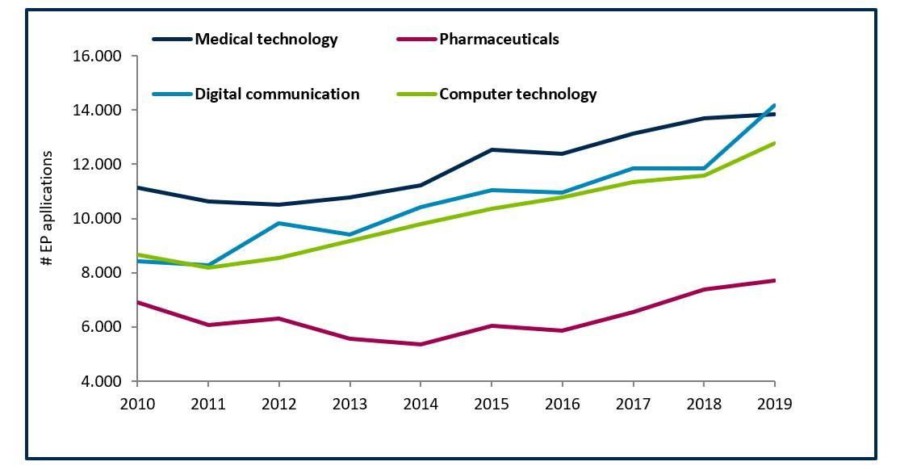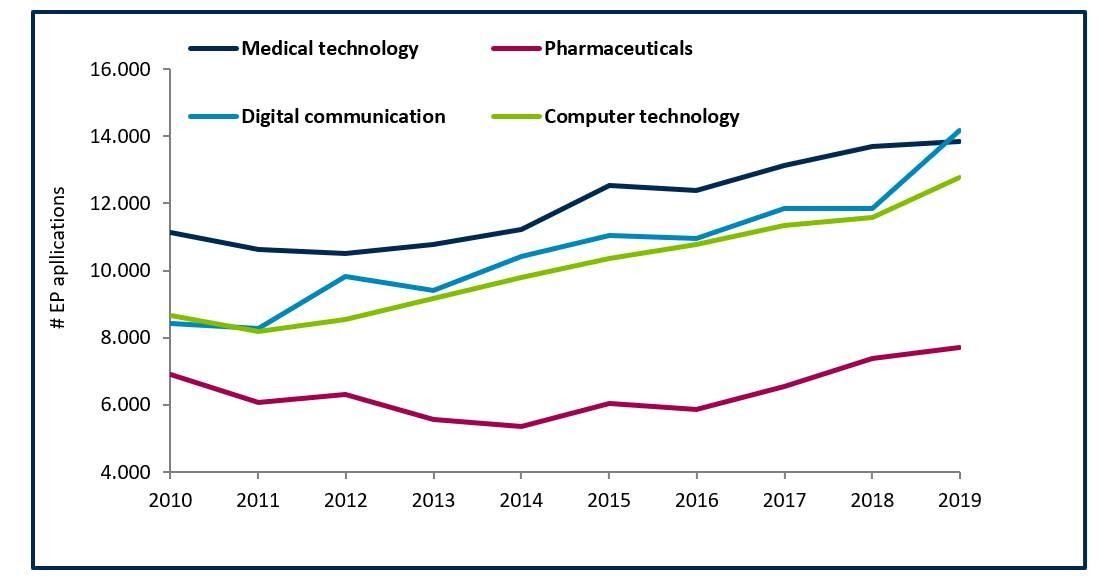Innovation is key to the success of companies and is driving many industries. This is certainly true for the medical technology sector. According to yearly research by the European Patent Organization (EPO) on filings and applications per field of technology, 13.833 med tech patent applications were filed in 2019. Contrary to the expectations of many, this way the med tech sector beats the computer technology (12.774 applications) and it is only since 2019 that the digital communication (14.175 applications) overtakes medical technology due to development surrounding 5G technologies. Compared to more similar sectors, for example pharmaceuticals (7.697 applications), medical technology also stands out – not only in absolute numbers but also in increase of applications in the last decade.

The EPO filings and applications are an excellent source to ‘measure’ innovation within the medical technology sector. In addition, it’s interesting to take a look at big tech companies and their focus on med tech innovation.
Consumer technology companies innovating med tech
Medical technology innovations can help to fulfill unmet patients’ and physicians’ needs by leveraging the latest technological advancements and by making use of the vast increasing digitization. The latter is also well understood by consumer technology companies like Google, Apple and Amazon. These companies are more and more equipped to innovate med tech using digital health data, e.g. via their own and others’ wearable technology. Apple’s CEO Tim Cook believes that “if you zoom out into the future, and you look back, and you ask the question ‘What was Apple’s greatest contribution to mankind?’ It will be about health.”
That the innovations in medical technology are numerous becomes clear when you take a look at recent patent applications in this field. Scrolling through these applications is a bit like time travelling; it allows you to imagine how healthcare could potentially look like in a few years from now. A good example of such an application is the one filed at EPO by tech giant Samsung earlier this year, entitled ‘Method and Electronic device for artificial intelligence (AI)-based assistive health sensing in Internet of Things network’. However much it sounds like a buzzword bingo, the intention and the innovative character of the application is clear.
Why we should embrace innovative health data initiatives
Why are companies like Samsung and Apple so eager to get access to this market? ‘Your health is your wealth’ goes the cliché and, with some skepticisms, you could now say that these companies want to use ‘your health (data) for their own wealth’. However, I believe we should embrace and encourage these innovative health data initiatives as these can tackle some of the challenges that lie ahead for the healthcare in general. The ageing population, but also increasing expectations of patients, are putting more and more pressure on our healthcare system and the demand for in-home healthcare. Not to mention the severe impact of pandemics like COVID-19 as we all are experiencing.
The huge amount of data, and the technologies like AI and IoT to cope with it, will result in an unprecedented transformation of the healthcare sector and will contribute in overcoming these challenges. Real-time data and intelligence can trace infected people very quickly, forecast outbreaks allowing to take the correct measures. AI could also be very beneficial in rapid diagnosis. For example, Alibaba claims that their AI can identify coronavirus infections with 96% accuracy via computerized tomography scans.
Furthermore, combining digital data from electronic medical records with data from wearables and biosensors can contribute to scientific breakthroughs in the development of new medicines and medical devices or new insights. It could also facilitate the switch from reactive to preventive healthcare. This not only reduces the pressure on our healthcare system, it also offers opportunities for earlier diagnosis in case of illness, disorders or diseases, which can result in faster intervention. In addition, it can also contribute to ‘measuring’ the effectiveness of the medicinal products. In turn, this personalized, more patient-centric healthcare allows for value-based payments, based on the medical achievement of the treatment rather than service-based payments based on what is done.
- Do you have any further questions about medical devices or innovative healthcare? Don’t hesitate to contact us!
